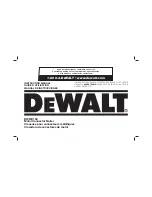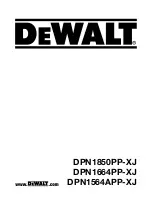
• Keep hands and body parts clear of
FIG. Q
FIG. R
FIG. S
immediate work area.
Hold workpiece
with clamps when necessary to keep
hands and body out of potential harm. Be
sure the workpiece is properly secured
before pressing the nailer against the
material. The contact trip may cause the
work material to shift unexpectedly.
(Fig. Q)
• Do not use tool in the presence of
flammable dust, gases or fumes.
The
tool may produce a spark that could
ignite gases causing a fire. Driving a nail
into another nail may also cause a spark.
(Fig. R)
• Keep face and body parts away from
back of the tool cap when working
in restricted areas.
Sudden recoil can
result in impact to the body, especially
when nailing into hard or dense material.
(Fig. S)
• Grip tool firmly to maintain control
while allowing tool to recoil away
from work surface as fastener is
driven.
In “Contact Actuation Mode” if
contact trip is allowed to recontact work
surface before trigger is released an
unwanted fastener will be fired.
• When using the sequential action
FIG. T
trigger, do not actuate the tool
unless the tool is placed firmly
against the workpiece.
• Do not drive nails blindly into walls,
floors or other work areas.
Fasteners
driven into live electrical wires, plumbing,
or other types of obstructions can result
in injury. (Fig. T)
• Stay alert, watch what you are
doing and use common sense when
operating a power tool. Do not use tool while tired or under
the influence of drugs, alcohol, or medication.
A moment
of inattention while operating power tools may result in serious
personal injury.
WARNING:
Some dust created by power sanding, sawing,
grinding, drilling, and other construction activities contains chemicals
known to the State of California to cause cancer, birth defects or other
reproductive harm. Some examples of these chemicals are:
• lead from lead-based paints,
•
crystalline silica from bricks and cement and other masonry
products, and
• arsenic and chromium from chemically-treated lumber.
Your risk from these exposures varies, depending on how often you
do this type of work. To reduce your exposure to these chemicals:
work in a well ventilated area, and work with approved safety
equipment, such as those dust masks that are specially designed to
filter out microscopic particles.
WARNING: ALWAYS USE SAFETY GLASSES. Everyday
eyeglasses are NOT safety glasses. Also use face or dust mask
if operation is dusty. ALWAYS WEAR CERTIFIED SAFETY
EQUIPMENT:
English
4






























